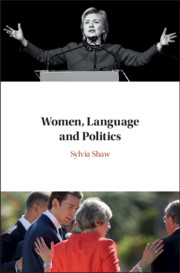Book contents
- Women, Language and Politics
- Women, Language and Politics
- Copyright page
- Dedication
- Contents
- Figures
- Tables
- Acknowledgements
- Abbreviations
- Transcription Conventions
- 1 Introduction
- 2 Gender and Language in Political Institutions
- 3 Women’s Linguistic Participation in a Traditional Male-Dominated Forum – The UK House of Commons
- 4 Women’s Linguistic Participation in the New Devolved Assemblies of the UK
- 5 Barriers to Women’s Participation in Politics
- 6 Case Study: Theresa May
- 7 Case Studies: Julia Gillard and Hillary Clinton
- 8 Women, Language and Politics
- Book part
- Notes
- References
- Index
6 - Case Study: Theresa May
Published online by Cambridge University Press: 08 May 2020
- Women, Language and Politics
- Women, Language and Politics
- Copyright page
- Dedication
- Contents
- Figures
- Tables
- Acknowledgements
- Abbreviations
- Transcription Conventions
- 1 Introduction
- 2 Gender and Language in Political Institutions
- 3 Women’s Linguistic Participation in a Traditional Male-Dominated Forum – The UK House of Commons
- 4 Women’s Linguistic Participation in the New Devolved Assemblies of the UK
- 5 Barriers to Women’s Participation in Politics
- 6 Case Study: Theresa May
- 7 Case Studies: Julia Gillard and Hillary Clinton
- 8 Women, Language and Politics
- Book part
- Notes
- References
- Index
Summary
In this first case study I start by describing Theresa May’s period in office as UK prime minister between 2016 and 2019. Then, an analysis of her performances in Prime Ministers Question Times (PMQs) with Jeremy Corbyn is undertaken, using the adversarial score devised in Chapter 3. The May–Corbyn exchanges are interesting because neither performer is typical in this context – May because she is a woman and Corbyn because he is a man whose stated aim is to make PMQs less adversarial. May’s style in debates is found to be highly evasive with some extremely adversarial elements and Corbyn also uses adversarial language. Next, May’s performances in ‘critical gendered moments’ (where gender or gender relations are explicitly discussed) are scrutinised. May is found to position herself as a feminist, but one who adheres to traditional, conservative gender roles, and she is shown to have some difficulty entering into the homosocial bonding activities of the old boy’s network because of how she is positioned by sexist, collaborative humour. Finally, I consider some gendered media representations of May, particularly in relation to emotion, and identify how she has resisted or exploited them.
Keywords
- Type
- Chapter
- Information
- Women, Language and Politics , pp. 178 - 210Publisher: Cambridge University PressPrint publication year: 2020



